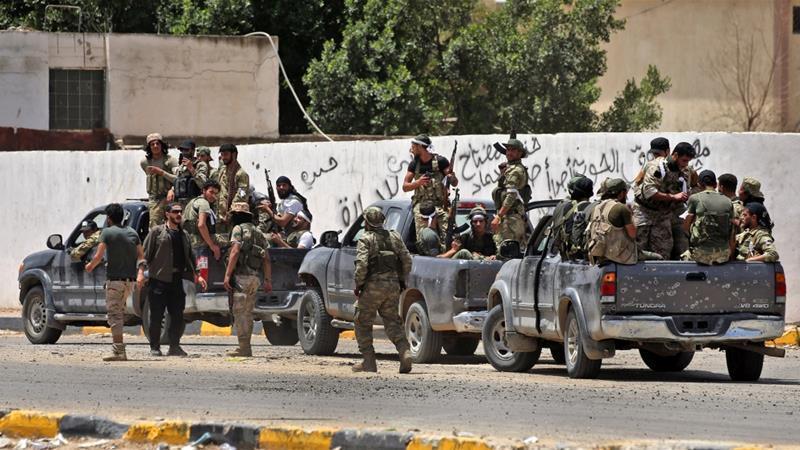
Turkey and Russia have continued dialogue to broker a ceasefire in Libya despite the disagreements over its methodology as they reiterate that a political resolution to the lingering conflict is still the best way.
Turkey underlines that a ceasefire to be reached in Libya should be a sustainable one after the strategic towns of Sirte and al-Jufra are liberated from Haftar’s forces.
Foreign Minister Mevlüt Çavuşoğlu and Russian Foreign Minister Sergei Lavrov held a phone conversation over the weekend to discuss a wide range of issues, including bilateral and regional matters, Libya being atop of it.
“During the conversation, an exchange of views was held on the state and prospects for the development of the situation in the Middle East and North Africa, with emphasis on the need for an early establishment of a ceasefire between the warring parties in Libya and the establishment of an inter-Libyan dialogue,” read a statement issued by the Russian Foreign Ministry on June 20. “The importance of the coordinated steps of Russia and Turkey for the political settlement of the Libyan crisis is noted,” it added.
A four-way meeting between the defense and foreign ministers of the two countries has been delayed due to the disagreements over how the ceasefire would be established in Libya. Turkey says a sustainable truce must be achieved under certain provisions that include drawing a ceasefire line through inter-Libyan negotiations and under the U.N.’s auspices. Russia is opting an urgent ceasefire which would be followed by talks.
Çavuşoğlu earlier told the media that the postponed meeting will be held in the coming days. At a press conference over the weekend, Çavuşoğlu reiterated that the best way to end the conflict in Libya is a political solution but without General Khalifa Haftar’s presence.
“Haftar did not heed the calls. To the contrary, he intensified his aggression. He is losing and he is doomed to lose. He had a chance for a political process, but he lost that, too. This kind of a putschist should have no role in a state rule,” he said.
Sirte and al-Jufra ‘should be evacuated for ceasefire’
In the meantime, İbrahim Kalın, the Turkish presidential spokesman, said that Turkey supports the Government of National Accord’s (GNA) position that Sirte and Al-Jufra should be evacuated by Haftar’s LNA forces for a “sustainable ceasefire.”
Ankara's support for the U.N.-recognised Government of National Accord (GNA) in Tripoli has turned the tide in the conflict in Libya which has been mired in fighting between rival groups since a 2011 uprising toppled longtime dictator Moamer Kadhafi.
Haftar, a former Kadhafi army commander who is supported by Egypt and the United Arab Emirates, has been battling to take the capital Tripoli since last year.
“It should be a sustainable ceasefire, meaning that the other side, the LNA [Libyan National Army], should not be in a position to launch another attack on the legitimate Libyan government any time it wants,” Kalın told Agence France-Presse in an interview in Istanbul.
Kalın said a ceasefire in Libya would be possible if everybody went back to their positions in 2015, referring to a political agreement reached that year in Morocco. That would mean Haftar withdrawing from Sirte and Al-Jufra.
“This is the position of the GNA, and we support it because right now the Haftar forces are using these strategic locations as their launching pad,” he said.
Turkish-backed GNA forces, which regained control of the whole of northwest Libya early this month, remain hampered in their advance toward Sirte, a coastal city and a gateway to major oil fields in the east.
The hometown of Gaddafi, Sirte, located 450 kilometers (280 miles) east of Tripoli, was a stronghold of the ISIL, before being taken over in 2016 by the GNA. It fell last January into the hands of Haftar's camp.
Turkey has forged strong ties with GNA head Fayez al-Sarraj, sending drones and air defense systems that helped him repel Haftar's recent offensive. A high-level Turkish delegation including Kalın, the foreign minister, and intelligence chief visited Tripoli on June 17.
Kalın also accused France of "jeopardizing" NATO's security by supporting Haftar.
"In Libya, we are supporting the legitimate government and the French government is supporting an illegitimate warlord and jeopardizing NATO security, Mediterranean security, North African security, and Libya's political stability," Kalın said.
"Given all this they still blame us, they still criticize us ... We are working with legitimate actors here. It is France that is intervening in all of those areas, working with the wrong actors, supporting illegitimate players, and then turning and accusing us."
Tensions have increased between Turkey and France, which has long been suspected of favoring Haftar until his recent battlefield setbacks.
"France for us is an important NATO ally. It is an important country in Europe. We don't want to have any tensions with France or any other country," Kalın said.
Eastern-based Haftar -- a 76-year-old former Gaddafi loyalist turned defector who spent years living in the United States -- has been backed by powers including Russia, the UAE and Egypt with aircraft, weapons and mercenaries.
Turkey sees no role for Haftar in Libya's future.
"He has been unreliable from the very beginning. He has spoiled every single ceasefire agreement, every attempt at de-escalation and the GNA will not support any talks that will involve Haftar. This is what we are gathering from their analysis and we support that," Kalın said.
Kalın accused the UAE of "financing this war" in Libya and called "foolish" its attempts to attack Turkey and President Recep Tayyip Erdogan for their role in the Arab-Muslim world.
On Egypt, Kalın said Ankara understands Cairo's "legitimate" security concerns over the Egyptian-Libyan border but supporting Haftar is a "wrong policy".
"They should support the GNA, they should support a Libyan-led political process."
Asked about Turkey's future in Libya, Kalın said: "We will be there as long as we are requested by the Libyan government to be there."